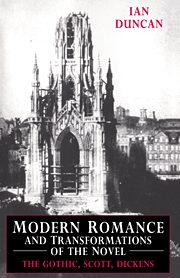5 - Scott and Dickens: the end of history
Published online by Cambridge University Press: 04 May 2010
Summary
‘Thinking of the fields,’ the turnkey said once, after watching her, ‘ain't you?’
‘Where are they?’ she inquired.
‘Why, they're – over there, my dear,’ said the turnkey, with a vague flourish of his key. ‘Just about there.’
‘Does anybody open them, and shut them? Are they locked?’
(Charles Dickens, Little Dorrit)It might have been thought by any other than a sternly tentative philosopher, that the denial of their natural food to human feelings would have provoked a reactionary desire for it; and that the dreariness of the street would have been gilded by dreams of pastoral felicity. Experience has shown the fact to be otherwise; the thoroughly trained Londonder can enjoy no other excitement than that to which he has been accumstomed, but asks for that in continually more ardent or more virulent concentration; and the ultimate power of fiction to entertain him is by varying to his fancy the modes, and defining for his dulness the horrors, of Death.
(John Ruskin, Fiction, Fair and Foul)Dickens's friend Percy Fitzgerald recalled Dickens's fondness and admiration for Scott, ‘the first of all the novelists’. Scott does not appear, however, among the eighteenth-century canon of novels and tales that nourished the author's childhood fancy, according to the autobiographical scene of reading in David Copperjield. In the 1820s Scott would have been too contemporary, thus expensive, to have featured in Dickens's father's small library of cheap editions.
- Type
- Chapter
- Information
- Modern Romance and Transformations of the NovelThe Gothic, Scott, Dickens, pp. 209 - 253Publisher: Cambridge University PressPrint publication year: 1992

